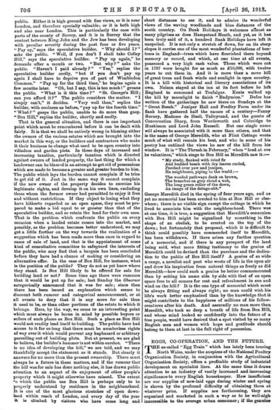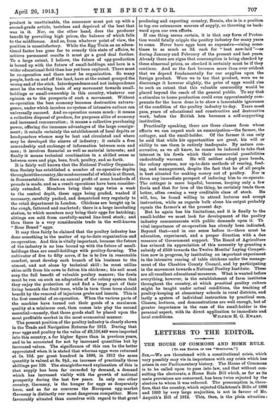EGGS, CO-OPERATION, AND THE FUTURE.
THE so-called "Egg Train" which has lately been touring North Wales, under the auspices of the National Poultry Organization Society, in conjunction with the Agricultural Organization Society, offers a profitable study of industrial development on specialist lines. At the same time it draws attention to an industry of vastly increased and increasing- significance to every English housekeeper. How insufficient are our supplies of new-laid eggs during winter and spring is shown by the profound difficulty of obtaining them at whatever price. If supplies are forthcoming, they are organized and marketed in such a way as to be well-nigh inaccessible to the average urban consumer; if the genuine
product is unattainable, the consumer must put up with a second-grade article, tasteless and deprived of the best that was in it. Nor, on the other hand, does the producer benefit by prevailing high prices, the balance of which falls to the middleman. And so, from whatever point of view, the position is unsatisfactory. While the Egg Train as an educa- tional factor has gone far to remedy this state of affairs, to achieve permanent results it must go a good deal further. To a large extent, I believe, the future of egg-production is bound up with the future of small-holdings, and here is a wider educational field than has yet been explored. There must be co-operation and there must be organization. So many people, both on and off the land, have at the outset grasped the wrong end of the stick. Interdependence and not independence must be the working basis of any movement towards small- holdings or small-ownership in this country, whatever our opinion as to the prospects of such a movement. Without co-operation the best economy becomes destructive extrava- gance, under which incubus no system of intensive culture can universally succeed. And co-operation means much : it means a collective disposal of produce, for purposes alike of economy and increased remuneration ; it means a collective purchasing power, offering the immense advantages of the large consign- ment; it entails certainly the establishment of local depots or headquarters whence may be lent and circulated and where may be developed the sinews of industry ; it entails a free comradeship and exchange of information between man and man ; it involves financial as well as material interests; and finally it means technical combination in a skilled sense as between cows and pigs, bees, fruit, poultry, and so forth.
It is fairly well known that the National Poultry Organiza- tion Society has established a number of co-operative depots throughoutthe country, the mostsuccessful of which is at Street, in Somersetshire. Here an annual profit of some hundreds of pounds is made, and as a result operations have been consider- ably extended. Members bring their eggs twice a week to the central depot, these eggs being graded, washed if necessary, carefully packed, and despatched very regularly to the retail department in London. Chickens are bought up in the rough, fattened and marketed ; there is a large incubating station, to which members may bring their eggs for hatching; sittings are sold from carefully-mated line-bred stock ; and then there is a very considerable trade in the well-known "Rose Brand" eggs.
It may thus fairly be claimed that the poultry industry has done something in the matter of np-to-date organization and co-operation. And this is vitally important, because the future of the industry is no less bound up with the future of small- holdings than are small-holdings with poultry-farming. The cultivator of five to fifty acres, if he is to live in reasonable comfort, must develop each branch of his business to the utmost, and not alone by technical skill : he must utilize skim-milk from his cows to fatten his chickens ; his soil must reap the full benefit of valuable poultry manure; the fowls must be run on such an adaptation of the colony system that they enjoy the protection of and find a large part of their living beneath the fruit trees, while in turn those trees should benefit by the removal of injurious grubs and insects. This is the first essential of co-operation. When the various parts of the machine have turned out their goods of a maximum quality at a minimum cost, then comes into play the second essential—namely, that those goods shall be placed upon the most profitable market in the most economical manner.
The present position of the poultry industry is clearly shown in the Trade and Navigation Returns for 1912. During that year eggs and poultry to the value of £9,158,449 were imported into this country, a far higher figure than in previous years, and to be accounted for not by increased quantities but by increased values. The significance of this can be the better appreciated when it is stated that whereas eggs were returned at 5s. 10d. per great hundred in 1898, in 1912 the same quantity is valued at 8s. 90., an increase of practically three shillings per 120. The straightforward explanation of this is that supply has been far exceeded by demand, a demand which has increased visibly with the growth of national prosperity during the last few years. In only one other country, Germany, is the hunger for eggs so desperately keen, and as far as concerns the European egg-market Germany is distinctly our most dangerous competitor. More favourably situated than ourselves with regard to that great
producing and exporting country, Russia, she is in a position to Lap our extraneous sources of supply, so throwing us back- ward upon our own efforts.
If one thing seems certain, it is that any form of Protec- tion would fatally cripple the poultry industry for many years to come. Never have eggs been so expensive—rising some- times to as much as 3d. each for "best new-laid "—as during January and February of the present and last years. Already there are signs that consumption is being checked by these abnormal prices, as checked it certainly must be if they continue. And so the fact becomes more than ever evident that we depend fundamentally for our supplies upon the foreign product. Were we to tax that product, were we to discourage it however slightly, the price of eggs would rise to such an extent that this valuable commodity would be placed beyond the reach of the general public. To say that a stimulus to home production could even approximately com- pensate for the harm done is to show a lamentable ignorance of the condition of the poultry industry to-day. Years must pass, years of educational and constructive and destructive work, before the British hen becomes a self-supporting institution.
Practically speaking, there are three classes from whose efforts we can expect such an emancipation—the farmer, the cottager, and the small-holder. Of the farmer it can only be said that while his opportunities are great, his will or ability to use them is entirely inadequate. By nature con- servative, as we all know, he cannot be induced to take that interest in his fowls which their commercial possibilities undoubtedly warrant. He will neither adopt pure breeds, the colony system, nor up-to-date methods of rearing, feed- ing, and management, despite the fact that he of all people is best situated for making money out of poultry. Nor is there any immediate prospect of inducing him to co-operate. The cottager is more hopeful, because, keeping only a few fowls and that for love of the thing, he certainly tends them better, often owning a very creditable class of stock. He will, too, be found willing to attend lectures and accept instruction, while as regards bulk alone his output probably equals the farmer's at the present day.
But be again has his limitations, and it is finally to the small-holder we must look for development of the poultry industry commensurate with public demands upon it. Th vital importance of co-operation has already been indicated. Beyond that—and in one sense before it—there must be education, experiment, and a proper direction with a due measure of Government support. The Board of Agriculture has evinced its appreciation of this necessity by granting a subsidy of £500 towards the Twelve Months' Laying Competi- tion now in progress, by instituting an important experiment in the intensive rearing of table chickens under the manage- ment of the Cheshire County Council, and by participating in the movement towards a National Poultry Institute. These are all excellent educational measures. What is wanted before everything, however, is the establishment of farm institutes throughout the country, at which practical poultry culture might be taught under actual conditions, the teaching of poultry-keeping at elementary schools in rural districts, and lastly a system of individual instruction by practical men. Classes, lectures, and demonstrations are well enough, but of greater importance in the case of the small-holder is the personal aspect, with its direct application to immediate and



























































 Previous page
Previous page